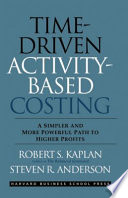
Time-Driven Activity-Based Costing: A Simpler and More Powerful Path to Higher Profits
In the classroom, activity-based costing (ABC) looks like a great way to manage a company's limited resources. But executives who have tried to implement ABC in their organizations on any significant scale have often abandoned the attempt in the face of rising costs and employee irritation. Time-Driven Activity-Based Costing is the solution to the problems associated with large-scale ABC implementation. In this book, Kaplan and Anderson offer a revised model where managers can estimate the resource demands imposed by each transaction, product, or customer, rather than rely on time-consuming and costly employee surveys. In their new model, Kaplan and Anderson focus on the two parameters managers need to estimate: how much it costs per time unit to supply resources to the business activities (the total overhead expenditure of a department divided by the total number of minutes of employee time available) and how much time it takes to carry out one unit of each kind of activity (as estimated or observed by the manager). Rather than endlessly updating and maintaining ABC data, this book with allow managers to spend their time addressing the deficiencies the model reveals: inefficient processes, unprofitable products and customers, and excess capacity. Kaplan and Anderson lead the discussion of Time-Driven ABC in the first seven chapters, followed by individual cases studies of actual implementations by Acorn consultants in diverse settings.
Utgiven: 2013
ISBN: 9781422163566
Förlag: Harvard Business Press
Språk: Engelska
Sidor: 266 st
In the classroom, activity-based costing (ABC) looks like a great way to manage a company's limited resources. But executives who have tried to implement ABC in their organizations on any significant scale have often abandoned the attempt in the face of rising costs and employee irritation. Time-Driven Activity-Based Costing is the solution to the problems associated with large-scale ABC implementation. In this book, Kaplan and Anderson offer a revised model where managers can estimate the resource demands imposed by each transaction, product, or customer, rather than rely on time-consuming and costly employee surveys. In their new model, Kaplan and Anderson focus on the two parameters managers need to estimate: how much it costs per time unit to supply resources to the business activities (the total overhead expenditure of a department divided by the total number of minutes of employee time available) and how much time it takes to carry out one unit of each kind of activity (as estimated or observed by the manager). Rather than endlessly updating and maintaining ABC data, this book with allow managers to spend their time addressing the deficiencies the model reveals: inefficient processes, unprofitable products and customers, and excess capacity. Kaplan and Anderson lead the discussion of Time-Driven ABC in the first seven chapters, followed by individual cases studies of actual implementations by Acorn consultants in diverse settings.
Begagnad bok (0 st)
Varje vecka tillkommer tusentals nya säljare. Bevaka boken så får du meddelande när den finns tillgänglig igen.



